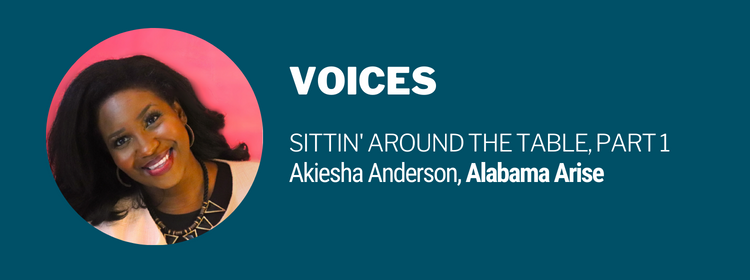Alabama Forward sat down with some of its partners to discuss their objectives for the upcoming session. These organizations are paying close attention to how our state leaders engage topics on race, religion, education, equality, poverty, criminal justice, sexuality, health care, voting rights, and other issues progressives advocate for across the state.
This is a three-part table read concerning some of the initiatives, legislation, engagements, and events they will either be leading, involved in, curious about, or paying close attention to while championing the labor of civic engagement and social impact. In this first part, we sit down with Akiesha Anderson, policy and advocacy director at Alabama Arise. This interview has been edited for length and clarity. Read part two with ACLU of Alabama and part three with Greater Birmingham Ministries.
Can you tell me about your work – your responsibilities – at Alabama Arise?
I manage a team of policy analysts and policy advocates. Overall, our mission at Alabama Arise is to help and advance policies that benefit Alabamians marginalized by poverty. We do that through policy analysts who are at the state house during legislative sessions, tracking bills, analyzing legislation, lobbying, etc. Our policy advocates work more on administrative level advocacy, working with agencies to ensure that policies and practices are favorable to people we seek to help; they also spend time in community educating community members about different rights and benefits they have through the policies enacted by the legislature or agencies.
What are some of the three top issues you hope this state legislature tackles this session? How have you been engaging these topics within your organization? What steps will you take to directly engage legislators on the issues you seek to address?
Three issues that immediately come to me are 1) Medicaid Expansion, 2) getting rid of the state level grocery tax, and 3) death penalty reform.
With regard to Medicaid Expansion, we do lead a coalition known as Cover Alabama, which has over 100 partner organizations – community members that are all dedicated to seeing Medicaid expanded in the state, and ending the health coverage gap which means a lot of people made too much money to be eligible for Medicaid but too little money to be eligible for a private marketplace based insurance plan. So, we definitely want to see the 250,000+ people in this state get health coverage, especially seeing that we are still in the middle of a pandemic. I know people think it’s over, but I just heard a story recently of several people who got COVID this past week. We just released county fact sheets that basically show the impact of Medicaid expansion on each county throughout the state of Alabama, and throughout this legislation session we will educate our legislators with those fact sheets to help bring it down to a granular level for them as to say, “This is how Medicaid Expansion impacts you and your constituents.” There are 37 new legislators this session, which is a significant chunk of new legislators in the State House, so there is a lot of education that is going to be required on all the issues we are working on, so we will be spending a lot of time educating and trying to get new allies on some of our issues.
With regard to the grocery tax, we have been working with Senator Andrew Jones and Representative Patrice McClammy to get legislation drafted that will get rid of the state’s grocery tax. Legislation has been introduced for decades to get rid of this – but there hasn’t been a mechanism to replace the revenue that’s lost by getting rid of the tax. Before inflation that revenue was about 500 million dollars a year from the grocery tax. We don’t want to harm the Education Trust Fund Budget, which is where that grocery tax revenue goes, so we have come up with a plan to basically get rid of a tax loophole for the wealthiest of Alabamians as a way to replace that grocery tax revenue. So once that bill is filed, we will definitely try to garner support and lobby legislators, explaining to them what the bill does. We’ve put together some information documents that we’ll probably release on a weekly basis and hand out to legislators.
Alabama is a poor state, so we are talking about the majority of Alabamians when we talk about who is really hurting from the grocery tax. When you think about the regressive aspect of it, for poor people, let’s say the average family spends 500 dollars a year on grocery taxes which may not seem like much but its 3 percent of someone’s income if they only make 15,000 a year, but it’s a smaller percentage of someone’s income if they make 150,000 dollars a year. You add in inflation and other things, and you see that families are really struggling to put food on the table. We aren’t seeking to “punish” the individual of wealth, but we need to do something about the system. We are talking about the people who make $150,000 individually and $300,000 as a couple, which is a much smaller fraction of Alabama’s population. That’s what we hope will help us win this issue with legislators.
With regard to the death penalty, you may have heard, but the governor mandated the Department of Corrections to conduct an internal review concerning their death penalty practices. We have a lot of issues with the death penalty, and right now our policy analyst, Mike Nicholson, is a part of a coalition with lawyers and other advocates, trying to figure out ways to encourage the governor to do an external audit to come in an evaluate those practices. And we anticipate that Representative Christopher England will file a bill – making, retroactive, a piece of legislation that he got passed a few years ago that bans judicial override, particularly a judge’s ability to sentence someone to death when that’s not what the jury themselves decided. We will be helping to advance this legislation by lobbying legislators. England has also prefilled a bill that requires a unanimous jury before someone is sentenced to death, and we will be pushing for that bill’s passage also.
Alabama remains 1 of 11 holdout states against adopting Medicaid Expansion. South Dakota is the latest state to adopt the expansion – by way of a ballot initiative. Their voters decided, making way for health care services to reach more than 50,000 of their citizens, despite having a Republican Governor who opposes the decision. What are your thoughts about them allowing the voters to decide by way of the ballot? Do you think if the decision of Medicaid expansion was left up to Alabamians, we – Republicans, Democrats, and independents – would decide to expand the program?
Unfortunately, in Alabama, there is no way to leave this decision up to a ballot initiative. It’s not something we have legislatively allowed. I’ve talked to our legislative services agency to see if there is a way to draft a bill where legislatively legislators say we will make this a ballot initiative. It is unfortunate Alabama voters don’t get to be the final decision maker, but we do believe that if this was something that could be a ballot initiative in Alabama, then it would overwhelmingly pass. Arise has utilized Sygnal, a polling firm that often works closely with the legislature. And we have found that the vast majority of Alabamians support Medicaid expansion, and when you break it down by party affiliation, about 66 percent of Republicans support Medicaid expansion, so we would love to do a ballot initiative. Part of what we are doing with these county fact sheets is bringing it home for legislatures where these stats will be on the poll, showing them, they would have support of their constituents. It’s kind of alarming that legislators will say there isn’t the political appetite for this, or we don’t know how to pay for it. I don’t know how many studies they need to see to show that not only do we have the money to pay for it but we will bring in money for this; it’s going to pay for itself. But we have to do a lot of education to get legislators to feel safe about moving forward.
Let’s talk about poverty for a second. Is there something that Alabama isn’t doing that they should be doing to confront poverty more productively?
A few things we are hearing that could really benefit folks we care about are things like better access to childcare, transportation, and stable housing. Another priority we have is to weigh in on the way we use the remaining ARPA COVID Relief funds. We would love to see the legislature appropriate money to these areas of concern. The state could do better in helping everyday people, especially with their concern of people not working, or being underemployed.
The Republican supermajority in the Alabama State Legislature forces more progressive thinkers and organizations to come up with different definitions of success before, during, and after each legislative session, particularly since 2010. So, what will success look like for you and your organization throughout this session and after it is over? What does a win look like for your organization?
In our line of work, wins often look like mitigating harm. Things like stopping legislators from putting awful requirements as an attachment to getting public benefits. I wish we lived in a state where we didn’t have to be so much on the defensive all the time. But that’s the reality of our legislature a lot of the time. For this legislative session in particular, success probably looks like seeing tangible evidence that our public education to legislators leads to some traction on our issues. For example, having bills come up in committee, to have them being heard will be a success, especially for something like Medicaid Expansion. Our health committee hasn’t heard a bill on Medicaid Expansion in years – if ever. For other bills like the grocery tax bill: we want to see it move through committee and the chambers. For me, success will look like getting the full grocery tax repealed, but I know that for some legislators getting a partial grocery tax will look like a win for them. But even if it is partial, it is an incremental step in getting that full repeal. And then for death penalty issues, seeing a bill move through the process. Success looks different on different issues.
What resources does your organization provide to address the issues you advocate for legislatively?
Before the legislative session, we do legislative previews. We have one coming up on March 6th. We write blog posts regularly about some of the different issues we are working on. And we also release reports on a variety of issues. All these things can be found on our website. Also being on our mailing list is a resource of itself, where we send out a number of things like news articles to help people stay abreast of the current events happening in Montgomery.
Are there any events that your organization plans to host during the sessions, and if so, what are your plans for them?
We are going to have a few lobby days. Cover Alabama, which we are at the forefront of pushing Medicaid expansion, will have a lobby day on March 21, so definitely invite people to register and come out as we work through the halls of the State House, letting legislators know we care about getting Medicaid expanded. And then our regular Alabama Arise lobby day will be April 11th, 2023, so people can come out and let their voices be heard. Each lobby day will have some level of training. The best way to get involved with us is to join our mailing list and become a member, where you have a direct say in what issues we prioritize every session, which is a really unique aspect of our organization. We are a democratically shaped organization in the sense that instead of the policy agenda coming from me, it comes from the people we represent, the communities we are advocating for at the State House. Every Fall, we have a membership meeting, where our members advocate for issues they’d like to see on our priority list, and then everyone votes for what issues they would like to see us support.
Follow Christian on Twitter @CG_Crawford. Follow Alabama Arise on Twitter, Facebook, Instagram, or on their website.




Join Arise on March 6th for a briefing ahead of the 2023 Legislative Session. More info here: https://www.alarise.org/event/action-briefing-preparing-for-the-2023-legislative-session/.
Pingback: Sittin’ Around the Table: A Conversation with Greater Birmingham Ministries - Shake the Field
Pingback: Sittin' Around the Table: A Conversation with Dillon Nettles, ACLU of Alabama - Shake the Field